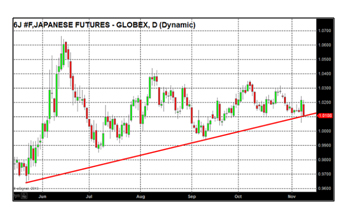Three Reasons the Fed Won’t Taper QE in December (Despite Today’s Jobs Report)
This morning’s jobs report was certainly a positive surprise, but despite the fact that the bond market is getting hit hard, I’m not entirely sure that this report pulls forward any Fed tapering from the current March expectations.
First, despite the strong October print, the rolling six month average of the jobs report (which gives a better picture of the labor market) is still just 176k, which is below where the average was in June and well below the 200k+ that most think is necessary for the Fed to start tapering QE.
Second, although it was largely ignored with all the jobs report hysteria this morning, there was another important economic report released at 8:30 AM – Personal Income and Spending. Contained in that report is something called the Core Price Index, which is the Fed’s preferred measure of inflation. And, it didn’t change much – the September Core PCE Price Index rose just 0.1% in September, and year over year is up just 1.2%,which is the same level as August, well below the Fed 2.0% target. Earlier this week Fed President Bullard said they were in no rush to taper QE because inflation is low – and clearly that trend hasn’t changed.
Finally, one of the reasons that the Fed chose not to taper QE in September was because of the rise in interest rates ahead of that meeting.. The Fed saw those increases in interest rates as a threat to the economic recovery. Well, since the FOMC meeting last week, in just over 7 days the yield on the 10 year Treasury has risen from 2.47% to 2.74%, a one month high. If rates keep rising into December, that will deter the Fed from tapering QE once again.
Instead of playing the guessing game of “taper vs. no taper,” I think one best ways to play the current environment is to revisit a trade I’ve been on top of since last December – long Japanese stocks/Short the Yen. To me, the clear takeaway from today’s Report is we won’t see a material decline in the dollar any time soon, and I believe one of the best ways to play that is by getting long Japanese stocks via DXJ or short the yen via YCS.
Regardless of whether the Fed tapers or not, we likely won’t see any material US Dollar weakness over the coming months, and that should mean a resumption of the downtrend in the yen, and a rise in Japanese stocks.
As I’ve been saying in recent editions of The 7:00’s Report, the yen has been held up by various “one offs” over the past few months: The government shutdown, the spike in SHIBOR rates, and the plunge in the dollar after the “no taper” surprise. But, with those events removed, I believe the yen decline will resume, as a yen below 100/dollar simply won’t result in the kind of economic growth PM Abe and the BOJ are striving for. They want the yen lower, and generally speaking you always want to be on the same side of the trade as a countries central bank.

